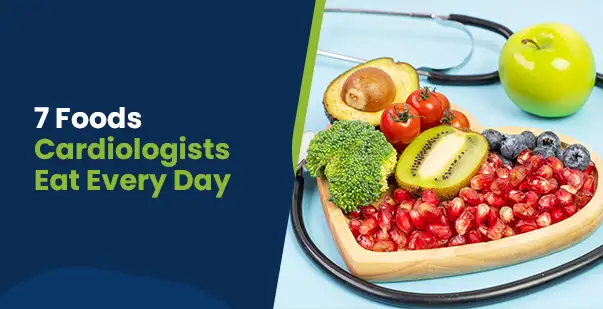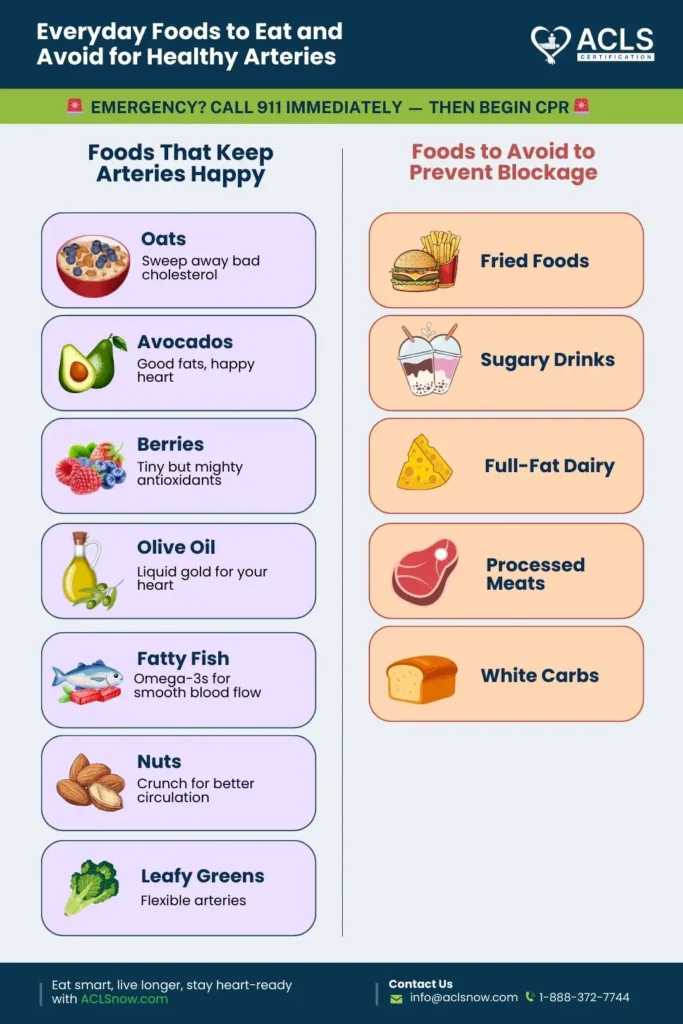Blocked arteries are one of the biggest silent threats to your heart. According to the World Health Organization, cardiovascular diseases cause over 17.9 million deaths globally every year, and a large number are linked to poor diet and lifestyle.
Some foods help keep your arteries clear. These are known as heart-healthy superfoods, and they work by reducing cholesterol buildup, lowering inflammation, and improving blood flow. You don’t need fancy supplements, just smart choices on your plate. From berries to leafy greens, what you eat every day can make a big difference to your heart health. If you are looking to support your arteries naturally, start with these seven heart-healthy superfoods that are as tasty as they are powerful. So, read on to get the complete list and benefits.
Master ACLS Now
Get ACLS certified with confidence
How Do Arteries Clog?
Arteries are the vessels through which the oxygen-rich blood travels from your heart to the rest of your body. Healthy arteries have smooth inner walls and stay flexible, allowing blood to flow easily through them. Over time, though, plaque can build up inside these linings, a condition referred to as atherosclerosis.
The plaque is composed of fat, cholesterol, calcium, and other substances found in your blood. As the plaque builds up, it slowly constricts the arteries, making it harder for the blood to pass through. In more advanced types, the surface of the plaque can rupture, triggering a blood clot that may block the artery entirely. Such a blockage has the potential to lead to life-threatening situations, such as a heart attack or a stroke.
What is the cause of this buildup? It is most often linked to a poor lifestyle. Diets rich in saturated fats, trans fats, and added sugars, and a lack of exercise, along with smoking habits, significantly raise the risk. Others are obesity, high blood pressure, being in a high cholesterol state, or being diabetic, which can also accelerate the process of the deterioration of your arteries.
Read More: What are the Stages of the Cardiac Cycle?
How Changing Your Diet Can Help with Heart Disease?
The food you eat directly affects your blood pressure, cholesterol levels, weight, and even how your arteries function. Even small, consistent diet changes can have a major impact. One easy way to start is by adding heart-healthy superfoods to your meals. The benefits of these foods are:
Lowers LDL (Bad) Cholesterol
Eating fiber-rich foods like oats and fruits helps reduce low-density lipoprotein (LDL) cholesterol. High LDL can lead to plaque buildup in arteries, increasing the risk of heart disease. A heart-healthy diet helps remove excess cholesterol from the bloodstream.
Raises HDL (Good) Cholesterol
Healthy fats from foods like nuts, avocados, and olive oil can increase high-density lipoprotein (HDL) cholesterol. HDL acts like a cleaner by removing excess cholesterol from arteries and carrying it to the liver for disposal, reducing heart disease risk.
Lowers Blood Pressure
Reducing sodium and eating potassium-rich foods like bananas and leafy greens can lower blood pressure (hypertension). This reduces stress on artery walls and prevents damage that can lead to heart attacks, strokes, and other cardiovascular problems.
Reduces Blood Sugar Levels
Limiting added sugars and refined carbs helps control blood glucose levels. Stable blood sugar supports insulin function and reduces the risk of type 2 diabetes, which is a major risk factor for heart disease and artery damage. Instead of refined white sugar, opt for healthier alternatives like:
- Fresh fruits (e.g., berries, apples, bananas) for natural sweetness
- Dates or figs in desserts and smoothies
- Raw honey or maple syrup in small amounts
- Coconut sugar or jaggery in traditional recipes
- Stevia or monk fruit extract as zero-calorie sweeteners
Helps with Weight Loss
Choosing low-calorie, nutrient-rich foods like vegetables and whole grains helps reduce body mass index (BMI). Maintaining a healthy weight eases pressure on the heart and lowers the chances of developing high blood pressure or high cholesterol.
Reduces Inflammation
Anti-inflammatory foods like berries, fatty fish, and leafy greens help lower levels of C-reactive protein (CRP), a marker of inflammation. Chronic inflammation can damage artery walls and promote plaque buildup, increasing heart disease risk over time.
Read More: US States with the Healthiest Hearts
7 Everyday Foods That Can Help Keep Your Arteries Unclogged
Foods That Keep Arteries Happy
🌾 Oats – Sweep away bad cholesterol
🐟 Fatty Fish – Omega-3s = smooth blood flow
🥑 Avocados – Good fats, happy heart
🥜 Nuts – Crunch for better circulation
🍓 Berries – Tiny but mighty antioxidants
🥬 Leafy Greens – Green power = flexible arteries
🫒 Olive Oil – Liquid gold for your heart
Foods to Avoid to Prevent Blockage
🍟 Fried Foods – Grease = clogged pipes
🥓 Processed Meats – Salty + fatty trouble
🥤 Sugary Drinks – Sugar crash for your arteries
🍞 White Carbs – Empty fuel, plaque risk
🧀 Full-Fat Dairy – Heavy on bad fats
Love your heart? Start with your plate. Small swaps = big wins!
Eat smart, live longer, stay heart-ready with ACLSnow.com
An article published inHarvard shows that people who follow a heart-healthy diet can reduce their risk of artery buildup by nearly 30%. And you don’t need to shop for exotic ingredients or expensive health foods. Some of the most powerful artery-cleansing nutrients are hiding in everyday items already in your kitchen. Some of the superfoods for heart health are:
-
Oats
Oats are rich in soluble fiber, especially beta-glucan, which helps lower LDL (bad) cholesterol by binding to it in the digestive system. This fiber prevents cholesterol from being absorbed into the bloodstream, reducing plaque buildup in arteries. A study published in the Journal of Nutrition found that consuming 3 grams of oat beta-glucan daily can lower LDL cholesterol by up to 6.5%. A daily bowl of oatmeal supports heart health and may lower the risk of atherosclerosis (narrowing of the arteries).
-
Fatty Fish (like Salmon and Mackerel)
Fatty fish are high in omega-3 fatty acids, such as Eicosapentaenoic acid (EPA) and Docosahexaenoic acid (DHA), which help reduce inflammation in blood vessels and lower triglyceride levels. These healthy fats also help prevent blood clots and improve endothelial function, keeping arteries flexible and strong. Eating fatty fish at least once per week supports a healthier cardiovascular system.
-
Avocados
Avocados provide monounsaturated fats, which help decrease LDL cholesterol while increasing HDL (good) cholesterol. They’re also rich in potassium, a mineral that helps control blood pressure by balancing sodium levels in the body. A 2025 clinical trial published in the Journal of the American Heart Association found that eating one avocado per day for 26 weeks resulted in modest reductions in LDL cholesterol and total cholesterol in US adults with abdominal obesity. However, the effect size was smaller than in earlier studies. Including avocados in your diet supports healthy blood vessels and may reduce the risk of hypertension and artery damage.
-
Nuts (like Almonds and Walnuts)
Nuts are packed with unsaturated fats, fiber, and antioxidants like vitamin E. Walnuts are especially high in alpha-linolenic acid (ALA), a plant-based omega-3 fatty acid that supports heart health. A small handful of nuts daily can reduce inflammation, improve blood lipid profiles, and promote better circulation in the arteries. Research published in MDPI-Nutrients found that people who ate walnuts regularly had a 15% lower risk of cardiovascular disease compared to those who didn’t.
-
Berries
Berries such as strawberries, blueberries, and raspberries are rich in polyphenols and anthocyanins, powerful antioxidants that protect blood vessels from damage. These compounds reduce oxidative stress and inflammation, which are major contributors to plaque buildup. Berries are also high in fiber and low in sugar, making them a heart-smart snack.
-
Leafy Greens (like Spinach and Kale)
Leafy greens are loaded with nitrates, which your body turns into nitric oxide, a molecule that relaxes and widens blood vessels, improving blood flow. They also provide vitamin K, which helps prevent artery calcification. A study published in the Cardiovascular Journal of Africa found that a high intake of leafy greens was associated with a lower risk of heart disease. Adding a serving of greens daily helps reduce blood pressure and supports cleaner, more flexible arteries.
-
Olive Oil
Extra virgin olive oil contains oleic acid, a healthy monounsaturated fat, and polyphenols, antioxidants that fight inflammation and protect the endothelium, the inner lining of arteries. Replacing butter or processed oils with olive oil can help lower LDL cholesterol and support overall vascular health. Use it for cooking or salad dressings.
Is Oatmeal Heart-Healthy?
Heart-healthy oatmeal is a popular breakfast that many people enjoy around the world. It’s not only warm and filling but also packed with nutrients that support heart health. There are several types of oats, and each one offers unique benefits for your heart and overall well-being. Some of them are:
-
Steel-Cut Oats
Steel-cut oats are considered to be the best oatmeal for heart health. They are least processed and take longer to cook, but they are great for your heart. They are full of beta-glucan, a special fiber that helps lower bad cholesterol. Their chewy texture and slow digestion also help keep blood sugar levels steady.
-
Rolled Oats (Old-Fashioned Oats)
Rolled oats are steamed and flattened, making them easier to cook than steel-cut oats. They still have lots of heart-healthy fiber and nutrients. They help lower LDL cholesterol and keep you full longer. Rolled oats are a great everyday option for a healthy breakfast.
-
Instant Oats (Unsweetened)
Instant oats cook very quickly, but they are more processed than other types. They can still be healthy if you choose the plain, unsweetened version. Avoid flavored packets with sugar or salt. Add fruits or nuts to make them both tasty and good for your heart.
Which Foods Should You Avoid for a Healthier Heart?
Certain foods, especially those high in saturated fats, trans fats, and added sugars, can quietly harm your heart over time. Diets high in processed and fast foods are linked to a 17% higher risk of heart disease. Limiting these foods is one of the most effective steps you can take to protect your heart and overall health. Below is the list of foods you can avoid for a healthier heart:
-
Fried Foods
Fried foods are high in trans fats and oxidized oils, which raise LDL (bad) cholesterol and promote inflammation. Regular intake increases the risk of atherosclerosis, a condition where arteries become narrowed and hardened due to plaque buildup.
-
Processed Meats
Meats like bacon, sausages, and hot dogs contain excess sodium, saturated fats, and preservatives like nitrates, which can damage endothelial function and increase blood pressure. These increase your risk of cardiovascular disease and clogged arteries over time.
-
Sugary Drinks and Snacks
Sodas, candies, and pastries are packed with added sugars that spike blood glucose and insulin levels. Excess sugar contributes to obesity, insulin resistance, and fat deposits in arteries, all of which increase your heart disease.
-
Refined Carbohydrates
White bread, pasta, and rice are low in dietary fiber and quickly convert to glucose in the body. This raises blood sugar and triglycerides, promoting insulin resistance and increasing the risk of heart disease and metabolic syndrome.
-
Full-Fat Dairy Products
Whole milk, cheese, and butter are rich in saturated fats, which can elevate LDL cholesterol. High intake of these fats contributes to plaque formation in arteries, raising the risk of heart attacks and other cardiovascular conditions.
Eat Smart for a Stronger Heart!
Taking care of your heart starts with what you eat. Adding heart-healthy superfoods like oats, berries, nuts, fatty fish, and leafy greens to your meals can help lower bad cholesterol, reduce inflammation, and keep your arteries clean. Oatmeal, in particular, is a powerful food that supports heart health by lowering LDL cholesterol and improving digestion. At the same time, it’s important to avoid fried foods, sugary drinks, and processed meats that can damage your arteries and affect your overall health. Start small, swap butter for olive oil, or enjoy a bowl of oatmeal for breakfast. Your heart will thank you for it!
And while you are taking care of your heart, why not learn how to take care of someone else’s? A BLS course can teach you how to respond in emergencies and possibly save a life, maybe even from a heart-related event.








